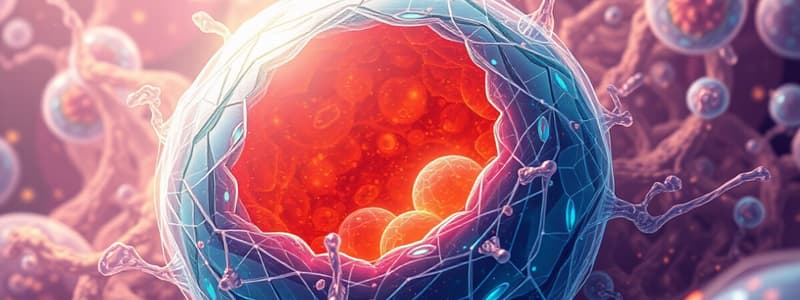Podcast
Questions and Answers
What is the primary function of the cell wall in bacteria?
What is the primary function of the cell wall in bacteria?
- To provide energy storage
- To facilitate protein synthesis
- To assist in cellular reproduction
- To protect against environmental stresses (correct)
Which component is essential for the survival of bacteria due to its protective function?
Which component is essential for the survival of bacteria due to its protective function?
- Cell membrane
- Nucleus
- Cytoplasm
- Peptidoglycan layer (correct)
What is the defining characteristic of the cell walls of organisms in the class Archaea?
What is the defining characteristic of the cell walls of organisms in the class Archaea?
- They are made of silica
- They lack peptidoglycan and have S-layer proteins (correct)
- They contain peptidoglycan
- They are composed of cellulose
Which of the following substances is NOT typically found in the cell walls of fungi?
Which of the following substances is NOT typically found in the cell walls of fungi?
What role does the nucleolus play within the nucleus?
What role does the nucleolus play within the nucleus?
Which of the following correctly describes the cytoplasm?
Which of the following correctly describes the cytoplasm?
Which eukaryotic cell wall component is characteristic of yeast?
Which eukaryotic cell wall component is characteristic of yeast?
What does the term 'cell envelope' refer to?
What does the term 'cell envelope' refer to?
What is the primary function of lysosomes in a cell?
What is the primary function of lysosomes in a cell?
What distinguishes rough endoplasmic reticulum (RER) from smooth endoplasmic reticulum (SER)?
What distinguishes rough endoplasmic reticulum (RER) from smooth endoplasmic reticulum (SER)?
Which organelle is primarily responsible for generating ATP?
Which organelle is primarily responsible for generating ATP?
How do chloroplasts contribute to energy production in plant cells?
How do chloroplasts contribute to energy production in plant cells?
What role does the Golgi complex play in cellular function?
What role does the Golgi complex play in cellular function?
Which statement regarding mitochondria is accurate?
Which statement regarding mitochondria is accurate?
Where are ribosomes found in eukaryotic cells?
Where are ribosomes found in eukaryotic cells?
Which characteristic is specific to chloroplasts?
Which characteristic is specific to chloroplasts?
Study Notes
Cell Walls
- Found in bacteria, plants, fungi, and algae
- Forms the shape of the cell
- Rigid and cannot change shape easily
- Provides support, structure, and protection
- Cell membrane and cell wall are called the cell envelope
- Contains peptidoglycan in bacteria, a peptide-polysaccharide matrix
- Peptidoglycan is essential for bacterial survival, protecting from environmental stresses
- Archaea lack peptidoglycan in their cell walls
- Archaea have an S-layer composed of surface-layer proteins
- S-layer provides a physical and chemical barrier
- Eukaryotic cells have diverse cell walls
- Polysaccharides like cellulose and pectin are found in some cell walls
- Fungi have cell walls containing cellulose and chitin
- Yeasts have cell walls composed of mannoproteins
- Diatoms have thick cell walls containing silica
Cytoplasm
- Open volume within a cell
- Composed mostly of water with dissolved substances
- Contains organelles, membrane-enclosed structures with specific functions
Nucleus
- Defining organelle of eukaryotic cells
- Defined by a double lipid bilayer containing the cell's DNA
- Command center of the cell
- Prokaryotic cells have genomic material within the cytoplasm
- Contains the nucleolus, the site of ribosome synthesis
Ribosomes
- Responsible for protein synthesis
- Found in the cytoplasm of prokaryotic cells
- Found attached to the endoplasmic reticulum in eukaryotic cells
Endoplasmic Reticulum (ER)
- Membrane-enclosed sacs and interconnected tubes
- Membrane is continuous with the nuclear membrane
- Composed of the smooth endoplasmic reticulum (SER) and the rough endoplasmic reticulum (RER)
- RER has ribosomes on its membrane surface, giving it a rough appearance
Golgi Complex
- Series of interconnected flattened sacs
- Located between the nucleus and cytoplasmic membrane
- Distribution center of the cell
- Modifies and packages proteins
Lysosomes
- Membrane-enclosed organelles containing hydrolytic enzymes
- Degrades unwanted cellular debris
- Waste disposal system of the cell
Mitochondria
- Double membrane-enclosed organelles responsible for generating ATP
- Powerhouse of the cell
- Contain cristae, folded internal membranes that increase surface area for chemical reactions
- Number of mitochondria varies per cell type
Chloroplasts
- Double membrane-enclosed organelles specific to algae and plants
- House the photosynthetic pigment chlorophyll
- Absent in animal cells
- Site of photosynthesis, converting sunlight into ATP and NADPH
Studying That Suits You
Use AI to generate personalized quizzes and flashcards to suit your learning preferences.
Related Documents
Description
Explore the critical structures and functions of cell walls and cytoplasm in various organisms. This quiz covers the composition and importance of cell walls in bacteria, plants, fungi, and algae, as well as the role of cytoplasm within cells. Test your knowledge on the unique features that support cellular integrity and function.




